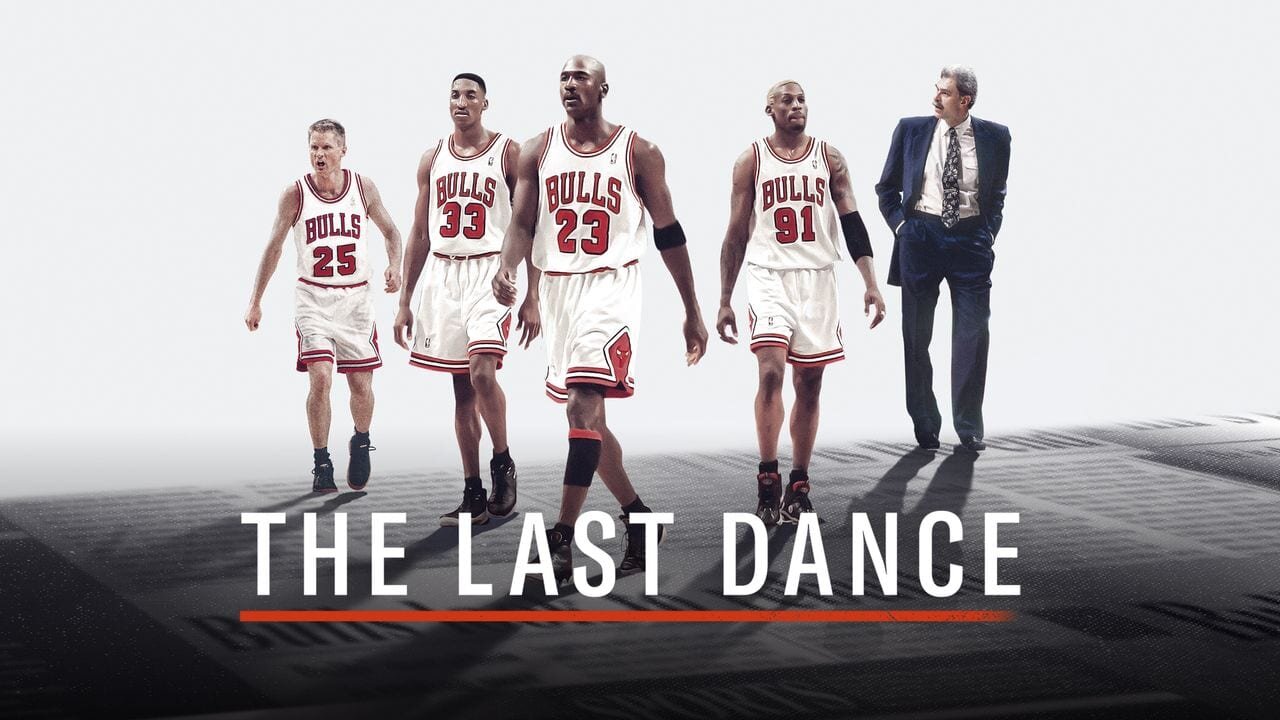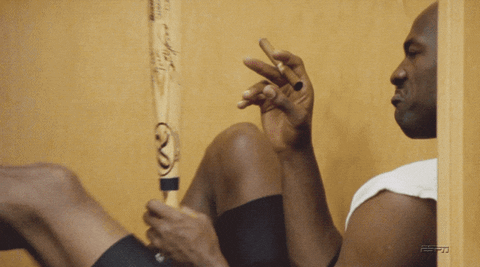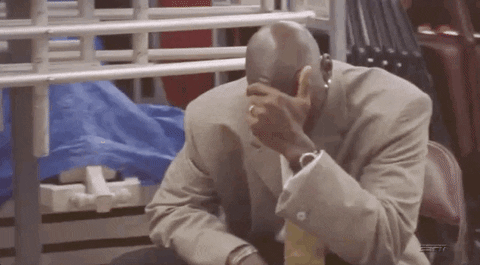The Parts of Michael Jordan and The Last Dance That Won't Let Me Go
I didn’t need The Last Dance to remind me that Michael Jordan is The G.O.A.T. I’m 34. I was a basketball-loving Black child during his ascent to God-like status in the 1990s. No exaggeration: he was only a rung below my father as far as men I considered heroes—tied at second place with Michael Jackson.
I had all of Jordan’s NBA home movies on VHS. I watched all of his big games in real time with my dad. I rewatched them endlessly on ESPN Classic and NBA TV, bought the Bulls DVD box sets, and today still find myself sucked into MJ Youtube wormholes. As a super fan, I knew there wasn’t going to be much I learned from the 10-part series. I knew about the shoes, The Shot, his Dad, Space Jam summer, The OG Dream Team, the rivalries…
So I honestly came into the premiere episode of The Last Dance with the hope that I’d see something deeper and dirtier that added more layers and texturing to someone I idolized and researched as a kid. Now that the series has wrapped, I can say that it achieved that for me. We all adored “Michael Jordan,” the maniacally competitive and skilled athlete, the disarmingly charming and cool dude. But this series, more-so than any other great article I’ve read in the past or quick anecdote from former teammates or opponents I’ve heard before, gave viewers a real window into who Michael Jordan—the man—is. Here are some of the Dance moments that are sticking with me.
“…a Good Man”
The night after it dropped, everyone was talking about the final minutes of The Last Dance’s seventh episode. Rightfully so. They’re awesome. But my favorite moment of the night came from Ep. 8, watching Michael Jordan a few days after a loss to the Charlotte Hornets in the second round of the 1998 playoffs. Charlotte stole Game 2 in Chicago, which was the result of former Bulls point guard BJ Armstrong hitting a huge shot. The victory tied the series at 1-1.
We see BJ’s big play in Dance. Armstrong has MJ guarding him, gets a screen at the top of the key, and right as he comes off the pick he pulls up for the jumper with Jordan’s trailing and unable to defend it. Armstrong hits the J and barks at the Bulls bench. He’s hype. It clearly meant a lot to him, considering he had a key role on the Bulls team that won three consecutive championships from ’91-93 and they didn’t protect him in the expansion draft—letting the new Toronto Raptors snatch him in 1995 (he bounced around a bit before landing in the Hornets’ nest).
We pick up days after the loss with Mike in the locker room wearing practice gear. He’s asked if he’s worried about the Bulls chances of winning the series or frustrated by his former point guard’s closing sting. The answer is No to both. He’s chilling, toying with a baseball bat, and smoking a cigar. As he takes playful semi-swings, it’s easy to assume that he’s imagining Armstrong and his Charlotte squad as the bat’s target.
“Let’s see if all [of BJ’s] trash-talking starts when it’s 0-0,” Jordan says between puffs, “instead of [having] a 5-6 point lead. That’s the sign of a good man—if he can talk shit when it’s an even score. Or when you’re behind. When you’re ahead, it’s easy to talk.”
I love The Last Dance for moments like this, one that distills the massive persona of Michael Jordan into a minute of potent TV. In a nutshell, that’s all of Michael Jordan right there—without showing him shoot, dribble, jump, or pass. He’s confident and unbothered, with an unparalleled conviction. From that clip alone, you just know Jordan and his squad is going to steamroll Charlotte for the rest of the series. And as we expect, the Bulls beat the shit of the Hornets from then-on. The Bulls won, 4-1. Fin.
“That’s All I Needed.”
A reoccurring point of emphasis in The Last Dance is Michael’s ability to turn a negative opinion into fuel for his competitive engine. Throughout the series, director Jason Hehir sets the table: People have an idea or do something that isn’t in Jordan’s favor, MJ guzzles it like thirst-quenching Gatorade and then whoops ass on the court at his earliest convenience. “That’s all I needed,” Jordan says often. A few of those examples:
In 1992 Portland Trailblazers guard Clyde Drexler, to some, was just as good a player as Mike. Of course, Michael thought otherwise. “…Me being compared to him,” he says in the doc, “I took offense to that.” During Game 1 of the NBA Finals against Drexler and the Blazers, MJ opens with 35 points in the first half of the game (including six three-pointers).
Knowing that then Bulls general manager Jerry Krause likes Phoenix Suns guard Dan Majerle’s game, Jordan uses that as motivation in the 1993 finals against the Suns. “You think he’s a great defensive player?” Jordan says in Dance, “Okay, fine. I’m going to show you he’s not.” Jordan averaged 41 points a game for the series. The Bulls won their second straight championship. Thunder Dan averaged 17.
The night before Game 1 of the 1996 NBA Finals against the Seattle Supersonics, Michael Jordan spots Sonics coach George Karl eating at the same restaurant he’s having dinner. Karl, not wanting to schmooze with the “enemy,” walks by MJ and leaves without greeting him. Jordan takes it personally and the Bulls stomp out the Sonics in six games.
LaBradford Smith, Toni Kukoc, Charles Barkley, Bryon Russell, Karl Malone and many, many more have, directly and indirectly, shifted MJ into kill-mode. Whether it was a random newspaper headline, a fictional story written in his head, or a player loud-mouthing him in-person, Michael was always looking for a match to ignite his fire.
The Price of Fame
There’s an idea out there that the ‘90s Bulls would have won at least eight championships had Jordan never retired and missed the ‘93-94 season and the bulk of ‘94-95’s. I don’t agree with that. Not because I think he or his teammates lacked the skill and talent to do so. Clearly, they were awesome. But The Last Dance does a tremendous job of revealing just how exhausting being Michael Jordan is.
Episode 6 probably spends the most time focusing on his popularity, opening with 1998 footage of Michael alone and comfortable in his hotel room, away from the pen-filled hands seeking autographs, mobs chasing his sports car, and the thick fog of expectation that comes with being a role model boasting a well-manicured image. “This is it,” he says while lounging. “Lay back. Watch TV all day… I don’t have to worry about anyone bothering me… This isn’t one of those lifestyles that you envy. [I’m] confined to this room. I’m ready for getting out of this life. You know when you get to that point. I’m there. With no reservations at all.”
In that suite moment, it’s apparent that life on a pedestal or in a fishbowl—no matter how nice the accommodations are—still isn’t the key to happiness. When you have as many eyes watching you as MJ did, it’s not as fun as viewers may think. Jason Hehir flipped the idea of MJ’s “perfect” life in a way that makes the common man question whether they’d want to be as famous as the subject.
My theory is simple: It’s hard enough maintaining an athletic level of excellence needed to be a champion annually. Add that to the brutally exhausting life he endured as tabloid fodder, spokesman, and a living legend. If MJ didn’t take that mid-’90s “vacation” (as he refers to it in Ep. 1), he probably would have suffered a mental or physical breakdown. The hiatus allowed him to recharge. Before worrying about taking care of others, you’ve got to be sure that you’re okay.
For most of this documentary, His Airness maintains his extraterrestrial stature. But it’s when The Last Dance brings him back to Earth that I truly found a new appreciation for Michael Jordan.




